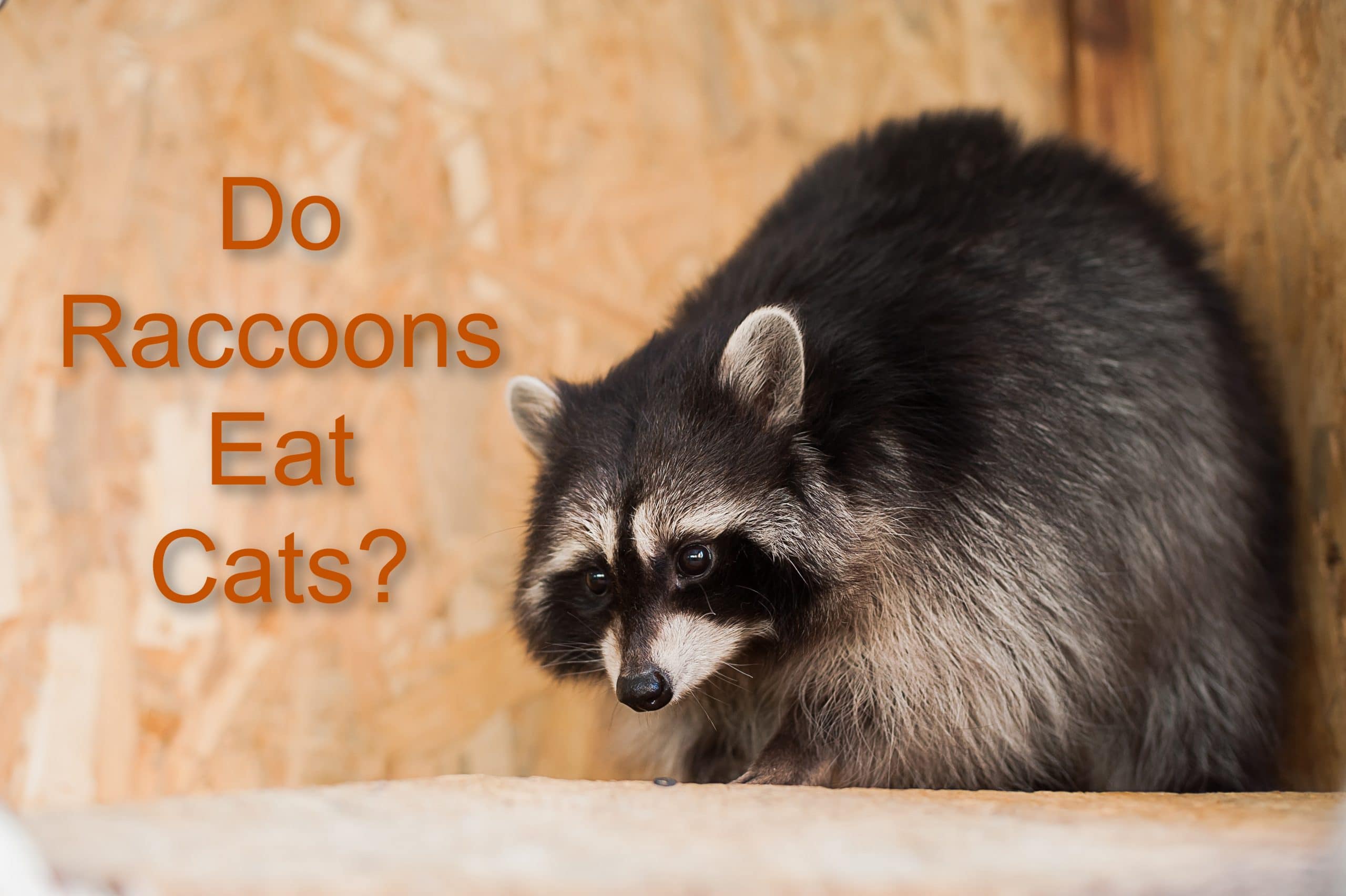When you hear the word raccoon, the thing that usually comes to your mind is a fuzzy little creature with a bushy tail and a dark mask on its face snooping around your backyard, but for pet parents, it might be something else. Raccoons are very adaptable creatures.
Therefore, they can live in different climates and environments. Many pet parents complain that raccoons pose a danger to their cats. These intruding raccoons either harm their cats and injure them, transmit diseases to them, or even kill them. Some of these cat owners struggle with keeping raccoons away and keeping their cats safe.
However, we still hear about cases in which raccoons and cats are getting along, and even impregnating some female cats, creating by that a hybrid breed of raccoon-cat. Which of these cases are true? And which of them are not? Can cats and raccoons get along? Do raccoons pose any danger to cats? Can cats keep raccoons away? And the most critical question, do raccoons eat cats?
NOTE: We want to inform our blog readers that before we publish any article, the team “Proudcatowners” does deep research based on experience and knowledge about cats and everything related to them, to guarantees reliable and precise information, satisfy the readers is our first priority.
Do raccoons eat cats?
Raccoons are known for being extremely adaptable; they eat whatever they have access to, which is why most of the time, many people find them eating out of their garbage. Their meals of choice are usually found in water or near water, such as frogs, crayfish, and snails. In addition to that, they feed off the dead animals, fruits, vegetables, and eve, insects.
Since their diet relies mainly on accessibility, if they do find some food resources, they can attack your cat or kittens. They also hunt occasionally and catch a rat or even a squirrel.
Can raccoons transmit diseases to my cat?
Yes, raccoons can infect your cat. The most common raccoon disease in cats is known as Baylisacaris procyonis, and it is a lethal intestinal disease. Cats can become infected from raccoons by either direct contact with them, or by ingesting eggs of the Baylisacaris. Raccoons can be immune to this parasite; feline creatures, however, will suffer from severe consequences once they are infected.
Symptoms of Baylisacaris procyonis in cats:
- Lethargy
- Enlarged liver
- Extreme pain
- Your cat becomes sensitive to light
- Problems with their respiratory system that leads to respiratory complications
- High fever
- Losing their vision
- Loss of coordination
- Stupor
- Suffering from visible severe eye infections
- Coma
- It can lead to death at times
How can my cat get this disease?
These parasites are usually left on the feces of the infected raccoon, and they remain on it until they find a new host. When cats go out to defecate, they might step on them and pick them up in their paws. Cats usually clean themselves by licking their body parts, including their paws, and that is how they get these parasites into their bodies. Another way of infection is through small animals that cats prey on, such as mice or birds. These prey could have this disease, and contaminate the cat once it is inside their bodies.
What should I do?
Raccoons disease in cats is hazardous and even lethal. If you notice any of the symptoms mentioned above, make sure you take your cat to the veterinarian immediately. There has not been a precise medication or cure to this disease yet. However, your vet would prescribe some medicines for your cat that would help with its case. You must be very careful with the recovery of your cat because it is a severe and sensitive period since this disease causes significant damage to the cat’s body.
Can raccoons give my cat rabies?
Rabies is a very dangerous and lethal disease to animals; it attacks their nervous system. Rabies can also be transmitted to humans if an infected animal bites them. This disease only affects mammals, and most wild animals, such as raccoons. However, in recent years, cats have become the most commonly infected animals with this illness as domestic animals.
How can I know if my cat has rabies?
In case your cat has been bitten by a rabid raccoon or injured in a fight with one, and it displayed one of the symptoms mentioned below, it is very likely that they caught the virus as well. This virus will travel to their nervous system and start attacking it.
Symptoms of Rabies in cats:
- Abnormal change of behavior (unusual shyness or aggression)
- Increased aggressiveness
- Your cat can become very sensitive to light
- High fever
- Pica
- Repetitive seizures
- Paralysis
- Your cat would struggle when swallowing anything
- Lack of coordination
- Hydrophobia
- Hypersalivation, which is excessive dripping salivation
- Frothy saliva
- Your car would be overly excited
- You would notice that your cat’s jaw dropped a bit
What should I do?
If your cat displays any of these symptoms, or you suspect he has rabies or might have caught the virus after a fight with a raccoon, for example, call your veterinarian immediately. If your cat is showing any abnormal change in behavior, put it in a cage if it is safe to do, or subdue it, and take it to the veterinarian immediately. Be careful from being bit or scratched by it, because your cat would display aggressive behavior, and rabies can be transmitted to humans through saliva.
Can raccoons attack my cat?
Yes, raccoons and cats get into many quarrels. If raccoons have enough food resources, they usually would not harm your cat or attack it. However, due to the cat’s behavior concerning marking its territory and being territorial about its surroundings, they can still get into fights with raccoons because of that.
However, raccoons might prey on cats and other small animals in case of hunger and lack of available food, or if you are feeding your cat outside, raccoons can, in this case, try to steal your cat’s food and get into a fight with one another because of this. Raccoon mothers also get into fights with cats sometimes to protect their babies from any potential danger.
Can a raccoon kill or eat my cat?
Raccoons are meat lovers, intelligent, and territorial animals, they also excellent hunters. If a raccoon attacks your cat, there is a very high chance that your cat would lose the fight, and most importantly, lose its life. Raccoons are very lethal to cats, and they can transmit a dangerous disease to them, which would eventually kill them. Raccoons can also kill and eat cats, especially small kittens since they depend on availability and accessibility in their diet. If a raccoon does not find available food, and they turn to hunt, they are capable of eating your cat no matter what breed it is.
Can cats help in keeping raccoons away?
Having a cat would not necessarily mean having no raccoons in your backyard. Raccoons are dangerous and robust animals, and they are bigger than your cat. If you have a cat, and you decide to feed it outside, for example, this will not only attract raccoons because of cat food, but it will also put your cat at high risk of being attacked by raccoons. Other ways might help you keep raccoons out of your backyard, but having a cat is usually not one of them.
How can I keep raccoons away from my cat?
There are a few tips you can follow to keep raccoons away from your backyard and to keep your cat safe from them. Some people choose harsh methods. They decide to set up traps or poison traps, but there is no need to use animal cruelty against raccoons when you can just follow these simple couple of advice.
Keep your cat inside:

Pet parents are always advised to keep their cats indoors, especially during the night. Raccoons are mostly active during nighttime. Therefore, as long as your cat is spending the night inside the house, and the raccoon is searching for food outside, or even in your yard, your cat is safe from it.
It is best for your cat’s health and safety to keep it inside at all times unless you step outside with it if you allow it to go to the garden or the backyard, for example. Keeping an eye on your cat is necessary because outdoor life can be dangerous for them, especially if you live in an area that has raccoons.
Never leave food outside:
If you feed your cat outside, whether regularly, or occasionally, make sure you always clean up after it once it is done eating. Never leave scrambles or food leftover, and you should not even leave the bowl or plate in which you fed your cat. The smell of food itself can attract raccoons, and it would be hard to get rid of them after that. In addition to that, avoid leaving food near open windows as well, because that can attract some unwanted and unwelcome visitors too.
Keep your backyard clean:
Not only should you clean up after your cat’s meal, but you should also avoid having a full trashcan. Raccoons search for food inside garbage cans as well, and leaving an open trash bag would be similar to giving them a free buffet. Make sure it is tightly closed, and that it does not stay there for too long.
Limit the water resources in your garden:
Here is an interesting fact for you, even though raccoons pick a lot of their food from your trash bag, they actually wash their food before eating it. So limiting the water supply in your garden, especially at night, would help send them away as well.
Lock and secure any window or cracks around the house:
Raccoons can easily find their way into your home through an open window, a small crack near the venting system in the basement, a small basement window, or your kitchen cat door. If a raccoon is inside your house, it becomes complicated to chase it out, and even more challenging to protect your cat from the danger it poses to its life and well being.
Setting up an excellent fencing system:

One of the easiest and cheapest ways to keep raccoons away from your backyard is to set up a raccoon-free fence around your house. Setting up this fence around your property would not cost you much, and it would keep the raccoons out, and your cats in. You can set up this fence by adding some chicken wire to the top of the fence; this would keep the raccoons from climbing up, as well as determine your cat’s surroundings and limit them.
How can I keep raccoons away from my cat? And what if they get into a fight?

If you notice your cat has gotten into a fight with a raccoon, it is best to scare the raccoon away. Do not depend on your cat to win the fight, or wait for them to fight it off. Raccoons are bigger than most feline creatures and will injure your cat, and in some cases, even kill it. Water usually scares off the raccoon. Motion controlled sprinklers are an excellent way to repel a raccoon.
And how can I protect my cat?
The best way to protect your cat, however, is to make it an indoor cat. You cannot always save your cat from a raccoon fight, especially if the quarrel is about food or territory. Another method to follow to protect your cat is by installing floodlights. Raccoons do not like crowds, and they do not like bright light either, which is why they mostly go out during the night.
Installing floodlight would help keep raccoons away from your cat and protect it from any attack by raccoons. Raccoons usually come to your backyard looking for food, and people find them snooping around their garbage cans; therefore, the best garbage can repel for a raccoon, is an empty one. If a raccoon does not find anything to keep it inside your yard or in your property, it will go away automatically.
Certain scents are naturally repelling for raccoons as well and would help you keep them away from your cats, such as cayenne pepper, ammonia, predator urine, Epsom salt, and the last one is mothballs. However, you must be careful with this latter, because even your cat can ingest this if it finds it laying around, so use it with extreme caution.
A raccoon has injured my cat, what should I do?
In case you notice a raccoon has injured your cat, you must take it to the veterinarian immediately. Raccoons are disease carriers, they can carry rabies, and they can easily transmit that to your cat through a scratch or a bite. They can also transmit other parasites to your pet, which will lead to deadly diseases that are hard to recover from, and might take away your cat’s life eventually.
In addition to that, raccoons can cause lethal injuries to your cat and even kill him. However, some injuries do not show clearly, and you can only notice symptoms after a while. If you suspect your cat has had any encounters with a raccoon, take it to the veterinarian immediately for a checkup. Your vet would run tests and prescribe some medications in case your cat has been infected.
Can a raccoon and a cat mate?
Even though raccoons are a bit larger than most domestic cats, they are still closer in size to them than other animals. Male cats will mate with female cats voluntarily. This can happen with tame male raccoons, but it can occur wild male raccoons and female cats as well.
There is not a barrier, an absolute physical one, that would separate the two or stop them from mating. Some cats also take care of baby coons at times, and they end up with the raccoon scent imprinted on them, which makes other mature raccoons attracted to them sexually. Their baby would be a cat-raccoon hybrid. The most common one is a hybrid with a body of a cat, but a thick and long tail of a raccoon.
Other animals that can attack your cat:
Several other lethal animals pose a danger to your cat other than raccoons. Here is a list of animals that can be found in your backyard, and which you need to watch out from to keep your cat safe:
Snakes:
Snakes are not very common to find, but they are prevalent in certain areas. If you live in an area that is popular to have snakes, keep your cat indoor, and as safe as possible from them. Even though many cats can get into fights with snakes and win, they can still get bitten and poisoned by them.
Squirrels:
Many cats get into a fight with squirrels and win most of the time. However, a squirrel‘s claws and teeth can cause severe injuries to your cat.
Scorpions:
If you live in the southeast area, you might want to look out for these little lethal creatures. A scorpion’s sting can be fatal to your cat. If you notice your cat limping, make sure you take it the vet immediately.
Porcupines:
It is not very common for a porcupine to attack your cat, however, its loose quills can pose a significant danger to your cat if it steps on them or swallows them by mistake.
Skunks:
These creatures are known to be very smelly, and if your cat gets into an encounter with one of them, it will end up as stinky as them. In addition to that, skunks have sharp claws that can injure your cat as well.
Groundhogs:
Prevention is the best method to save your cat since groundhogs would not usually leave their homes to attack your cat, but in case your cat gets in a quarrel with one, their sharp teeth and claws can damage your cat’s body.
Rats:
Yes, rats and mice are the prey of cats; however, that does not limit the risks of disease infection. Wild rats are everywhere, and they live in very nasty places, these rats can transmit a dangerous disease to your cat. Try to prevent any interactions between your cat and wild rats.
Conclusion:
Cats are usually indoor animals, and when they try the outdoor life, they could encounter some dangers. One of these dangers is the presence of raccoons in your backyard. Raccoons are easily adaptive, and their diet depends on whatever they have access to, if that means your cat, they will attack it and eat it. Raccoons will eat your cat if they do have other food resources around them, but there are cases where they will only get into quarrels with them over fight or territory.
Your cat might come out of that fight alive, but they risk being infected with raccoon disease or rabies. There are ways to protect your cat from raccoons and keep them away from your property. spùe of these methods are keeping your cat inside the house, supervising it if you allow it to go out, never leave any food or leftovers outside because that attracts raccoons, and make sure your trashcan is empty and clean. In case your cat has been injured by a raccoon, make sure you take it the veterinarian immediately.
Some male raccoons can mate with female cats, creating hybrid cat-raccoon babies. Other animals can attack your cat or injure them, such as snakes, skunks, squirrels, and rats. Prevention is the best protection method for your cat. Raccoons can eat cats, and you should be careful and try to protect your cat as much as possible, and try to keep them away by using water, sprinklers, or installing floodlights since raccoons do not like bright lights.




